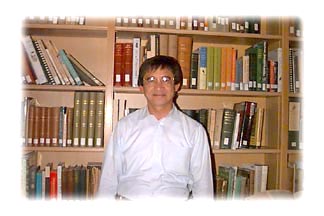| |
|
Luis F. Baptista
 B.S.,
M.S. University of San Francisco (1965, 1968). Ph.D., University of California,
Berkeley (1971). Max Planck Society and NATO Postdoctoral Fellow, Max
Planck Institute for Behavioral Physiology, West Germany (1972, 1973).
Assistant Professor of Biology and Curator, Moore Laboratory of Zoology
(1972-1978); Associate Professor (1978-1980). Associate Curator, California
Academy of Sciences (1981-1987); Curator, California Academy of Sciences
(1987-2000). American Representative, International Ornithological Committee;
Fellow, American Ornithologist's Union; Fellow, California Academy of
Sciences; Corresponding Member, Deutsche Ornithologen Gesellschaft; Honorary
Member, Cooper Ornithological Society, Wilson Ornithological Society,
Animal Behavior Society. Obituary
in San Francisco Chronicle. B.S.,
M.S. University of San Francisco (1965, 1968). Ph.D., University of California,
Berkeley (1971). Max Planck Society and NATO Postdoctoral Fellow, Max
Planck Institute for Behavioral Physiology, West Germany (1972, 1973).
Assistant Professor of Biology and Curator, Moore Laboratory of Zoology
(1972-1978); Associate Professor (1978-1980). Associate Curator, California
Academy of Sciences (1981-1987); Curator, California Academy of Sciences
(1987-2000). American Representative, International Ornithological Committee;
Fellow, American Ornithologist's Union; Fellow, California Academy of
Sciences; Corresponding Member, Deutsche Ornithologen Gesellschaft; Honorary
Member, Cooper Ornithological Society, Wilson Ornithological Society,
Animal Behavior Society. Obituary
in San Francisco Chronicle.
"My
childhood interests in keeping and watching birds were encouraged by my
parents and nurtured into a successful career by my mentor and friend
Robert T. Orr. He taught me about natural history, curating, collections
and about avian systematics. In graduate school, I discovered ethology
as a discipline. I concentrated on White-crowned Sparrows as a
subject of study, combining my interests in studying avian speciation
and bird behavior."
"Over
the last 20 years my colleagues and I have studied singing behavior song
and its "development" in White-crowned Sparrows. We have
documented subspecific differences in song as well as local "dialects".
At dialect boundaries we find occasional "bilingual" birds and
at one boundary a "creole" dialect evolved after 2 decades.
Using DNA-fingerprinting we are studying the possible role of female singing
in soliciting extra-pair copulations."
"More
recently we have been studying dialects in songs of lekking Costa Rican
hummingbirds. Song studies are being augmented with DNA-fingerprinting
techniques to document gene flow versus "meme"-flow between
dialectal populations."
"I began
studying Old World mannakins and New World grassquits when I was a post-doctoral
fellow in Germany. I took this work to the field--to Trinidad, Tobago,
Puerto Rico, Saint Lucia, and Curacao. With Tilton Fellow Pepper Trail
we found that based on morphology, anatomy and tarsal scutellation, several
New World finch species probably belonged to the radiation that included
Darwin's Finches. This has since been confirmed with DNA studies."
"In
1978, the handsome Zenaida graysoni
dove of Socorro Island, Mexico, was found to be extinct in the wild. I
began a program to breed captive populations for release into the wild,
once predators were removed. Restoration of the island by predator removal
and reforestation is under way, in cooperation with Mexican wildlife biologists
and the New Zealand Wildlife Service, and we look forward to returning
these doves to their ancestral home, restored to its pristine original
state. On June 6, 1994, the President of Mexico declared Soccoro Island
a biosphere reserve."
Read more
about the project to restore the Socorro Island Dove
English:
http://www.umsl.edu/~s1008864/Dove.html
Spanish:
http://www.umsl.edu/~s1008864/Paloma.html
Birds
and Beethoven
Charitable
contributions can be sent to the Luis Baptista Memorial Fund, California
Academy of Sciences, Golden Gate Park, San Francisco, CA 94118.
Welty, J. C.
and L. F. Baptista. 1988. The Life of Birds,
698 pp., 4th Edition, Saunders College Publishing, Philadelphia.
Baptista,
L. F. and P. W. Trail. 1988. On the origin of Darwin's Finches. Auk,
105:663-671
Baptista,
L. F. and K. L. Schuchmann. 1990. Song learning in the Anna Hummingbird
(Calypte anna). Ethology, 84:15-26.
Baptista,
L. F. and S. L. L. Gaunt. 1994. Advances in studies of avian sound communication.
Condor, 96:817-830.
DeWolfe,
B. B. and L. F. Baptista. 1995. Singing behavior, song types on their
wintering grounds and the question of leap-frog migration in Puget Sound
White-crowned Sparrows (Zonotrichia leucophrys pugetensis).
Condor, 97:376-389.
Baptista,
L. F. 1996. Nature and its nurturing in avian vocal development, pp. 39-60
In D. E. Kroodsma and E. H. Miller,
[eds.], Ecology and Evolution of Acoustic Communication in Birds, Cornell
University Press.
|